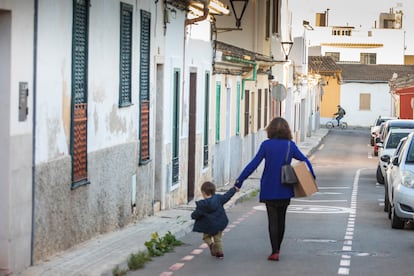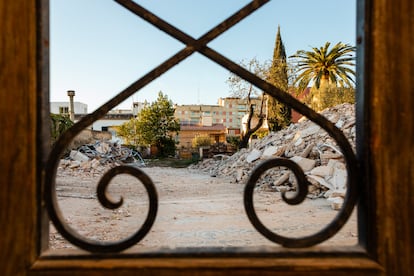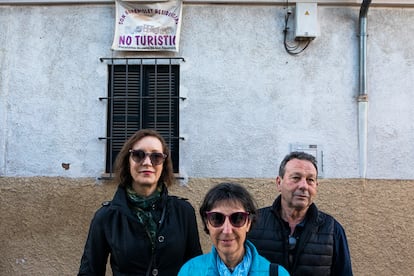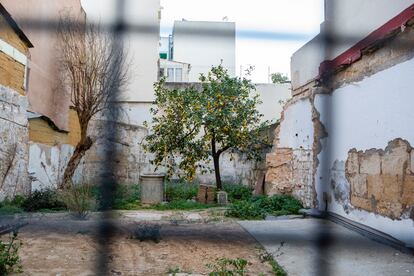Spain’s Balearic Islands propose a ban on foreign buyers
The local government is considering preventing non-residents from buying residential property, something Canada, New Zealand and several EU countries have done

For the past decade, Son Espanyolet – a classic neighborhood in the heart of Palma, on the island of Mallorca – has been up for sale. “Foreign buyers started flocking to Santa Catalina, where they took over. When they got tired of the noise and consequences of the nightlife, they came here, where everything is full of ground floors with patios,” says Mari Carmen Gutiérrez, who has lived in the quiet neighborhood for most of her life.
A walk through the area reveals an oasis of tranquillity in the middle of a city of 415,000 inhabitants. There are hardly any cars and there are freshly painted facades, with modern architecture coexisting with small, traditional bungalows. At first glance, you can’t tell that most of these homes have beautiful backyard patios and gardens, which also add to the surface area of the properties.
Idyllic neighborhoods such as Son Espanyolet are popular among wealthy foreign buyers, especially those coming from other EU countries. The attraction extends to the entire territory of the Balearic Islands, off the eastern Mediterranean coast of Spain.
Nearly 60,000 foreigners have acquired a home on the islands over the past 10 years. In 2021, the volume of real estate purchases by foreigners accounted for almost 40% of the market, according to the local property registry. Only the Canary Islands come close to this figure, with 25.87% of property sales attributed to foreigners.
The demand for housing is extraordinarily high, especially among German, British and French citizens. This explains why, in the Balearic Islands, the average price per square foot is around $300, making it the second-most expensive real estate market in Spain after Madrid ($329).
The escalation of prices has led the Balearic regional government – a coalition made up of three center-left and left-wing parties – to create a commission to analyze the possibility of prohibiting the acquisition of housing by those who have not been resident on the islands for at least five years.
A spokesman for Francina Armengol – regional chief of the Balearic Islands and a member of the center-left PSOE political party – stated in October of 2022 that the government is “in favor of setting limits on home ownership.”
Armengol’s deputy, Juan Pedro Yllanes of the far-left Podemos party, backed this type of restriction a few days ago. He mentioned Canada as a “role model.” On January 1, 2023, the Justin Trudeau government applied a foreign home ownership ban for a period of at least two years.
While several countries have imposed complete bans on foreign home buyers some – including Spain – have actually encouraged foreign residential investment by granting controversial “golden visas.” If someone buys an apartment or house worth at least €500,000 they can apply for permanent residency.
Several experts consulted by EL PAÍS doubt the legal feasibility of preventing the acquisition of real estate by non-residents. In any case, they don’t see this kind of policy as capable of having any significant effect on the overall price of housing.
In Son Espanyolet, finding affordable housing is increasingly difficult, due to the pressure of demand. Many residents agree on the need for the proposed restrictions.
“The Norwegian who bought many of the houses in the neighborhood would knock on the door and offer you €700,000 if you went to the notary the next day to formalize the sale,” says Juan Antonio Pérez, a member of the neighborhood council, which has spent years fighting against foreign buyers, many of whom buy up property to rent it out to tourists.
The atmosphere is tense, with clashes between local home owners and investors. “This Norwegian investor told us, laughing, that, in 10 years, none of us were going to recognize the neighborhood,” Gutiérrez recalls bitterly.

In 2022, foreigners bought more homes than ever in Spain. In the first quarter of the year, notaries recorded that at least 72,987 transactions were carried out by foreign buyers. This represents about 20% of all residential property sales across the country in that period.
Restrictions on the purchase of homes by foreigners or non-residents are more common than one might think. Like Canada, Australia and New Zealand have also placed restrictions on the purchase of houses by non-resident foreigners.
In the EU there are several countries – such as Denmark and Malta – where one must be a resident for at least a few years before being able to purchase a home. The restrictions are even tougher in the Finnish archipelago of the Aland Islands: Europeans who want to buy land in this Nordic area have to first obtain permission from the authorities.
“These three exceptions were negotiated before these countries became part of the EU. Taking this kind of action is more complicated when you’re already a member state,” says Joan David Janer, a professor of International Law at the University of the Balearic Islands.
EU treaties make it clear that there can be no restrictions based on nationality, freedom of residence, freedom to provide services and free movement of capital.
The Belgian region of Flanders and the Corsican Parliament are two examples of local governments that attempted to impose restrictions on non-resident buyers and renters, in 2009 and 2014 respectively. Both sets of measures were struck down, as they contravened European law.

Whether or not the initiative by the government of the Balearic Islands is feasible, experts are pointing out that, while such measures may have a direct effect in specific neighborhoods, overall there won’t be much change.
“Studies show that, when there’s a price increase in the luxury real estate sector, a drag effect is generated in other sectors… the most affordable housing ends up becoming more expensive,” explains Eduardo Robsy, an economist who was general director of housing in the Balearic Islands until the spring of 2022.
According to Robsey, housing problems in the region – and in other stressed areas of the world – usually respond to a growth in the general population that drives demand. The National Institute of Statistics forecasts that Spain will gain more than four million inhabitants over the next 15 years. The Balearic Islands are expected to grow most in relative terms, by at least 25%. For this reason, Robsy is convinced that, among other things, more investment in subsidized housing is needed. “There are no miracle solutions,” he says.
Hans Lenz, the president of the Balearic Real Estate Association, agrees that the big problem in his province is the lack of supply. “The Balearic population has not received new housing in sufficient quantities for a long time… it’s estimated that at least 16,000 homes are missing.”
The impact of bans on foreign home buyers has been negligible in the case of countries such as New Zealand, where this type of measure was adopted in 2018. Since then, housing has become 55% more expensive, says José García Montalvo, a professor of economics at Pompeu Fabra University in Barcelona.
García Montalvo scoffs at such policies, considering them to be populist and deceptive: “They consist of telling citizens that others are to blame,” he explains. “Also, these initiatives don’t cost the government money: it’s expensive to build more subsidized housing, which would be a more effective plan.”
In Canada, housing prices have been rising uninterruptedly since 2010. In 2022 – before Trudeau’s Liberal Party implemented the ban – prices had already fallen by 12% compared to the start of the pandemic. Housing prices were expected to fall by an additional 15% in 2023, without taking the new measures into consideration.
However, not everyone agrees that bans are ineffective. Javier Gil, of the Madrid Tenants Union, defends these restrictions: “The objective of this measure is that, if someone buys a house, it is to live in it. In other words, to put an end to speculation and buying to rent,” he recently posted on Twitter. The Canadian government echoed similar rhetoric when introducing the new housing legislation.

Southern Spain is another part of the country that is sought after by foreigners. Mario Garnica – director of the Engel & Völkers real estate company offices in Málaga – says that “the arrival of this type of client – with a high purchasing power – has pushed developers to build homes with quality standards, regenerating areas and creating wealth and employment in the city.” However, he also points out that “the other side of the coin is the rise in prices in the most-desirable areas, with price increases of about 20%, and the displacement of local populations to other areas.”
While sales to foreigners are restricted in Canada, countries such as Spain, Portugal, Panama and Ireland have opted for the opposite: encouraging investment through so-called golden visas, through which the state grants residence permits in exchange for buying a home of a certain value. In fact, this policy helped boost Madrid’s economic recovery program following the 2008-2014 Spanish financial crisis, when the economy shrank and unemployment skyrocketed.
Currently, 13 EU countries have citizenship-by-investment or residence-by-investment programs, which allows for third-country nationals to acquire EU permanent residence or passports in exchange for procuring real estate or other assets.
Sign up for our weekly newsletter to get more English-language news coverage from EL PAÍS USA Edition
Tu suscripción se está usando en otro dispositivo
¿Quieres añadir otro usuario a tu suscripción?
Si continúas leyendo en este dispositivo, no se podrá leer en el otro.
FlechaTu suscripción se está usando en otro dispositivo y solo puedes acceder a EL PAÍS desde un dispositivo a la vez.
Si quieres compartir tu cuenta, cambia tu suscripción a la modalidad Premium, así podrás añadir otro usuario. Cada uno accederá con su propia cuenta de email, lo que os permitirá personalizar vuestra experiencia en EL PAÍS.
¿Tienes una suscripción de empresa? Accede aquí para contratar más cuentas.
En el caso de no saber quién está usando tu cuenta, te recomendamos cambiar tu contraseña aquí.
Si decides continuar compartiendo tu cuenta, este mensaje se mostrará en tu dispositivo y en el de la otra persona que está usando tu cuenta de forma indefinida, afectando a tu experiencia de lectura. Puedes consultar aquí los términos y condiciones de la suscripción digital.








































